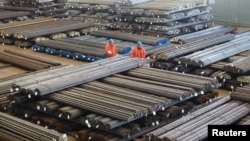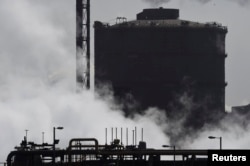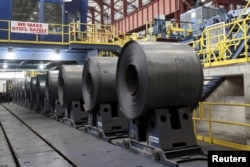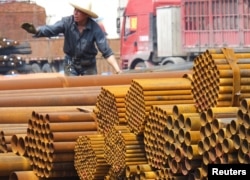Earlier this week, the United States joined the world’s major steel-producing nations to call for swift action on reducing global steel output — an oversupply crisis that most advanced economies believe is exacerbated by China’s excess capacities.
But the international push may not go anywhere because China, which accounts for half of world steel production, can’t afford to risk political and social instability at home while re-balancing its economy, analysts said.
That, they added, may strengthen the world’s tendency towards taking protectionist measures, such as anti-dumping tariffs, against the mega-producer.
“That tendency towards intervention, I think, is something that could go much further. And the intervention could extend beyond nationalization of industries to erection of tariffs to try to keep Chinese imports out,” said Russell Jones, a macroeconomist and partner of London-based Llewellyn Consulting LLP.
He was referring to the British government’s decision Thursday to assume up to a 25 percent stake in Tata’s U.K. operation as the Indian steel group announced an exit plan after being battered by a surge in cheap Chinese imports.
According to a spokeswoman for Prime Minister David Cameron, if the British government were to take an equity stake, it would be a minority one with “the aim of supporting the purchaser in delivering long-term future for the business.”
Call for action
Prior to that, the United States, Canada, the European Union, Japan, Mexico, South Korea, Switzerland and Turkey issued a joint statement on Tuesday calling for nations to act “quickly” to cut steel output — one day after they failed to reach a comprehensive multilateral agreement to do so during a crisis meeting in Brussels, which was attended by 30 countries, but not China.
On the same day, U.S. Commerce Secretary Penny Pritzker told the NPR news agency that the steel crisis has forced industry price declines, decreased profitability and caused the loss of 13,000 jobs in the past year.
China’s official Xinhua news agency criticized the Brussels meeting.
“Blaming other countries is always an easy, sure-fire way for politicians to whip up a storm over domestic economic woes, but finger-pointing and protectionism are counterproductive,” the paper’s editorial read.
To many, the paper’s undiplomatic reaction will only intensify the global conflict and possibly trigger a trade war, which Jones said is in no country’s interest.
Stability comes first
Instead, Jones said he expects China to pay some lip services abroad while rationally balancing the cost and benefit in restructuring its own economic woes at home.
“China doesn’t really have this sort of social safety net, the unemployment insurance, so on and so forth, that we are used to in the Western economies. So, they have used state-owned enterprises in many respects that are a sort of surrogate system of social insurance,” he said.
He added that China will make social and political stability its top priority, which will determine the pace of its economic restructuring.
Some politicians, such as Sajid Javid, Britain’s Secretary of State for Business, Innovation and Skills, are optimistic about China’s commitments to shed over capacities.
It is a stance that Lin Boqiang, director of the China Center for Energy Economics Research at Xiamen University, can’t stress enough.
He said Chinese steel mills are also suffering as 32.5 percent of global output went unused last year. As a result, more than half of the country’s major steel producers reported losses last year, although annual exports grew more than 20 percent to 112 million tons.
400,000 jobs at stake
Statistics from the China Iron and Steel Association indicate its member companies suffered a combined loss of 64.5 billion yuan ($9.9 billion) last year, compared with profits of 22.6 billion yuan ($3.4 billion) in 2014.
So Beijing is targeting the closure of 100-150 million tons of capacity at a cost of roughly 400,000 jobs within the next five years.
That means China has to find ways to re-employ those workers, most likely in a line of work unrelated to steel production, which won’t be an easy task, Lin said.
Meanwhile, the quickest cure to the sector’s overproduction is to boost China’s local demand by initiating local infrastructure projects, the professor suggested.
“If the demand side can be stimulated, [steel] prices can be bolstered by rising demand. With a rosier performance, it will be easier for businesses to plan an exit,” Lin said.
Lin urged steel-producing nations to refrain from taking mutually-destructive measures because the global market will have nothing to gain if the Chinese market crashes.
















